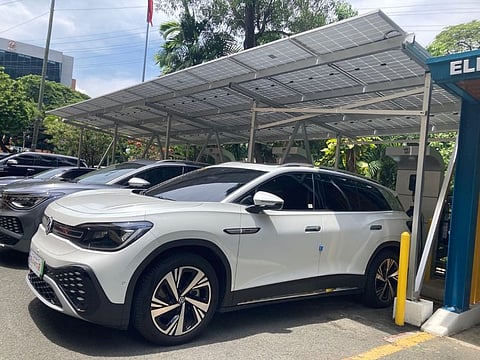Philippines powers up for electric vehicles: 76 charging station service providers accredited
Every charging station seen as a step towards cleaner air, sustainable energy ecosystem

Highlights
- New list of EV charging station providers boosts government policy and public enthusiasm for electric vehicles.
- Accreditation seen helping drive national agenda towards a sustainable electrified future.
Manila: Want to have an electric vehicle charging station in your garage or building? No problem, there's a long list of providers to choose from. Now the Philippines is accelerating its transition to electric vehicles (EVs) by accrediting charging station providers.
The latest Department of Energy list, published on June 14, 2024, shows 76 installers and service providers of EV charging stations. Household and institutional customers can refer to this list when they want assured quality of equipment and servicing.
"The country’s Electric Vehicle Industry is growing bigger with a total of seventy-six (76) DOE Accredited EVCS Providers that provides more accessible charging station solutions that are safe and reliable for your electric vehicle,” the DOE statement said.
The agency is prioritiaing the expansion of charging stations to ensure a smooth transition. A new law also mandates charging stations in malls and government buildings, addressing current and future needs.
Accreditation process
The accreditation process plays a crucial role in promoting the safe, reliable, and user-friendly development of the EV charging infrastructure in the Philippines, according to the agency.
EV charging systems, while becoming increasingly user-friendly, still require expertise to ensure safety, efficiency, and compatibility for both the electrical grid and the vehicles they serve. The move aligns with the fossil-fuel-dependent country's broader sustainability goals.
EV boom calls for infrastructure boost
Given the policy support, including tax-free imports of EVs and hybrids, the number of EVs on Philippine roads is climbing.
In 2021, there were a total of 8,600 registered EVs in the country. In 2023, about 10,600 more electric vehicles were sold in the Philippines, a 10-fold leap from just about 1,000 units in the previous year, according to Statista.
The national EV charging network is currently lacking: There were 96 new commercial EV charging stations installed in 2023, according to the DOE.
EV industry data shows there are 160 establishments with EV charging stations, of which 138 are AC (alternating current) stations, 20 are direct-current stations, and nine battery swapping stations.
Car industry data forecast total vehicle sales of 468,300 units for 2024, 9 per cent up from the 429,807 units sold in 2023.
Zero import tariff for EVs, HEVs and PHEVs
Industry officials predict a surge in electric vehicle (EV) sales in 2024, thanks to the recent expansion of Executive Order (EO) 12 by the National Economic and Development Authority (NEDA). The new policy now includes hybrid electric vehicles (HEVs) and plug-in HEVs, allowing them to benefit from zero import tariffs.
Accreditation
DOE-accredited EVCS providers are classified according on its scope of operation namely:
The focus on charging infrastructure reflects a trend towards greener transportation. Globally, the EV market is expected to reach 40 million units by 2030, with regions like Norway leading the way.
A robust EV network offers numerous benefits: reduced emissions, improved air quality, economic growth through job creation, and smarter grids for smarter cities.
While not significantly impacting total energy demand, EVs are expected to alter the load curve due to charging patterns.
The next step
Utilities, including power distribution giant Meralco, are also exploring "smart charging" technologies, where EVs act as mobile energy storage units, feeding power back into the grid during peak times. This incentivises off-peak charging, which helps stabilise the power grid through time-of-use tariffs.
The growing EV fleet presents revenue opportunities for utilities through electricity sales and connection charges. New jobs will be created in manufacturing, engineering, and maintaining the charging network.
By expanding EV infrastructure, the Philippines is paving the way for a future where electric vehicles are the norm. The utilities sector, which has rolled out massive renewable power generation projects, will be crucial in ensuring grid efficiency and resilience.
Sign up for the Daily Briefing
Get the latest news and updates straight to your inbox



